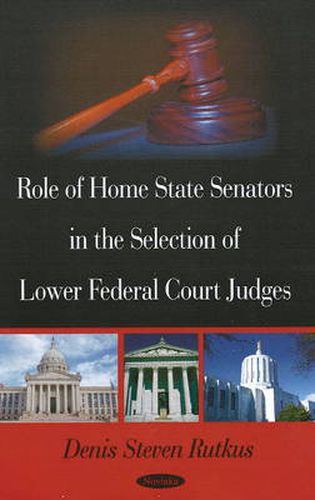Role of Home State Senators in the Selection of Lower Federal Court Judges
Denis Steven Rutkus

Role of Home State Senators in the Selection of Lower Federal Court Judges
Denis Steven Rutkus
Supported by the custom of senatorial courtesy, Senators of the President’s party have long played, as a general rule, the primary role in selecting candidates for the President to nominate to federal district court judgeships in their states. They also have played an influential, if not primary, role in recommending candidates for federal circuit court judgeships associated with their states. For Senators who are not of the President’s party, a consultative role, with the opportunity to convey to the President their views about candidates under consideration for judgeships in their states, also has been a long-standing practice – and one supported by the blue slip procedure of the Senate Judiciary Committee. Senators, in general, exert less influence over the selection of circuit court nominees. Whereas home state Senators of the President’s party often dictate whom the President nominates to district judgeships, their recommendations for circuit nominees, by contrast, typically compete with names suggested to the Administration by other sources or generated by the Administration on its own. Whether and how a state’s two Senators share in the judicial selection role will depend, to a great extent, on their respective prerogatives and interests. Senators have great discretion as to the procedures they will use to identify and evaluate judicial candidates, ranging from informally conducting candidate searches on their own to relying on nominating commissions to evaluate candidates. Contact between a Senator’s office and the Administration can be expected to clarify the nature of the Senator’s recommending role, including the degree to which the Administration, in its judicial candidate search, will rely on the Senator’s recommendations. If a President selects a district or circuit court nominee against the advice of, or without consulting, a home state Senator, the latter must decide whether to oppose the nomination (either first in the Senate Judiciary Committee or later on the Senate floor). From the Senator’s standpoint, opposition to the nomination might serve a number of purposes, including helping to prevent confirmation or influencing the Administration to take consultation more seriously in the future. On the other hand, various considerations might influence the Senator not to oppose the nomination, including the desirability of filling the vacant judgeship as promptly as possible and, if more home state vacancies are possible in the future, whether these might provide the Senator a better opportunity for exerting influence over judicial appointments. In recent years, the role of home state Senators in recommending judicial candidates has given rise to various issues, including the following: What constitutes good faith or serious consultation by the Administration? Should home state Senators always have the opportunity to provide their opinion of a judicial candidate before he or she is nominated? How differently should the Administration treat the input of Senators, depending on their party affiliation? What prerogatives should home state Senators have in the selection of circuit court nominees? Should the policy of the Judiciary Committee allow a home state Senator to block committee consideration of a judicial nominee?
This item is not currently in-stock. It can be ordered online and is expected to ship in approx 4 weeks
Our stock data is updated periodically, and availability may change throughout the day for in-demand items. Please call the relevant shop for the most current stock information. Prices are subject to change without notice.
Sign in or become a Readings Member to add this title to a wishlist.

